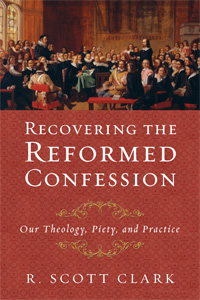Alongside of the archetypal knowledge of God, found in God Himself, there is also an ectypal knowledge of Him, given to man by revelation. The latter is related to the former as a copy is to the original, and therefore does not . . . Continue reading →
Recovering the Reformed Confession
The Practice Of The Sabbath In Calvin’s Geneva
Between 1542 and 1609, the Consistory frequently interviewed and sometimes reprimanded people for working on Sunday, whether for pruning trees, making lace, selling tripe, unloading boats, hunting birds, or moving furniture. The Consistory also disciplined people for engaging in recreational activities on . . . Continue reading →
Let The Cool Kids Be Cool
…Since the Great Awakening, many American Protestants have allowed market forces to dictate how Christianity is presented to the watching world. That faith once delivered to the saints was repackaged for the Second Great Awakening, kicked up a notch for the great . . . Continue reading →
Reformed Is A Confession More Than A Culture
These arguments often come down to definitions. If we define culture as the sum of a series of factors including language, a web of relationships (family, community), that shapes the way we think about food, clothing, and work then culture is one . . . Continue reading →
Are There Two Distinct Reformed Views Of The Sabbath?
Does The Continental View Really Exist?
On Twitter Anthony Bradley pointed us to a webpage by Ra McLaughlin on the Sabbath. There is good material there but there are also a couple of items that warrant discussion. The one on which I want to focus in this post . . . Continue reading →
New Tool For The Study Of Reformed Orthodoxy
By David Systsma—Scholars now have a new tool for the early modern religious and philosophical history in its academic context. From the beginning of the Reformation at the University of Wittenberg to the establishment of the Academy of Geneva, schools were integral . . . Continue reading →
One of the Dirtiest Little Secrets About Preaching
One of the dirtiest little secrets about preaching is that many preachers are using what we used to call in radio “a service.” There are, or at least there used to be, businesses that sell jokes and one liners and gags and . . . Continue reading →
The Abiding Validity Of The Creational Law In Exhaustive Detail
A correspondent to the HB writes: People can gloss over the term all they want, but secularism is still what it is, a rival religion and ethos to Christianity. The real divide between the FV and anti-FV crowd began with Van Til . . . Continue reading →
Evangelicalism And The Reformed View Of The Law
Note: This post first appeared in February 2008. Since that time the original link to Pulpit Magazine has been taken down. The archives at Pulpit Magazine only go back to 2012. § At Pulpit Magazine, Nathan Busenitz is tackling the question of . . . Continue reading →
Reformed Is Enough Or Why I Wrote RRC
David J. Miller published a lengthy account yesterday of his journey out of the OPC to Eastern Orthodoxy and to Anglicanism of different sorts and back to confessional Presbyterian and Reformed theology, piety, and practice. It’s a long-ish piece but it’s a . . . Continue reading →
Ishmael and Infant Baptism
We heard a sermon from Genesis 17 this morning, and I couldn’t help but draw some conclusions relative to the current discussion about infant baptism that is ongoing at Together For the Gospel and at Between Two Worlds. Of course this is . . . Continue reading →
Law, Gospel, And The Three Uses of the Law
By “law and gospel” I refer to the difference between those of us who hold to the historic and confessional distinction between those places in Scripture where God commands and those places where he promises. Historically, Protestants have described these two ways . . . Continue reading →
Wearing Crosses or Bearing Them?
In my past life, battling through the highway throng on the ‘5’ out of Escondido, I used to stare in amazement at the gas guzzling Christian four by fours thundering past my little Volkswagen. As I tried to prevent myself from being . . . Continue reading →
The QIRC-er Must Be Right
QIRC is an acronym: Quest for Illegitimate Religious Certainty. It has at least two aspects. The first is the ancient, sinful desire to know what God knows, the way he knows it. That is what the Evil One offered to us in . . . Continue reading →
Jonestown and the Reformed Movement
On 18 November 1978, more than 900 people died in “Jonestown,” Guyana in one of the most spectacular examples in modern times of the danger of cults and sects. Jonestown was a settlement on the northeast coast of an ignored South American . . . Continue reading →
It’s More Than A Semantic Difference
I do not forget that some of the respected and beloved brethren, who are regarded as the advocates of the doctrines alluded to, tell us continually that they believe substantially as we believe; that the difference between them and us is chiefly, . . . Continue reading →
Is The Confession Of The Substance Of Our Faith?
David writes to ask about a brief essay I wrote several years back on the distinction between the substance and accidents of the faith and how I reconcile what I wrote there with what I’ve been arguing about the nature of confessional . . . Continue reading →
Exacting Subscription Opposed By Latitudinarians And Heretics
A subject of this nature will engage our attention on the present occasion: namely, the importance of creeds and confessions for maintaining the unity and purity of the visible church. This is a subject which, though it properly belongs to the department . . . Continue reading →
Ministers All?
The uniqueness and centrality of the official preaching of the Word is diminished when we equivocate between the official, public, ordained administration of the Word and the unofficial witness to the gospel by the laity. The tendency among evangelical is to describe all . . . Continue reading →
Bog Standard Evangelicalism Circa 1962
I’m cleaning out my office and clearing out a great lot of books One of the volumes I found is Carl F. H. Henry, Basic Christian Doctrines (New York: Holt, Rhinehart, Winston, 1962). Included in this collection of very brief entries are G. . . . Continue reading →












